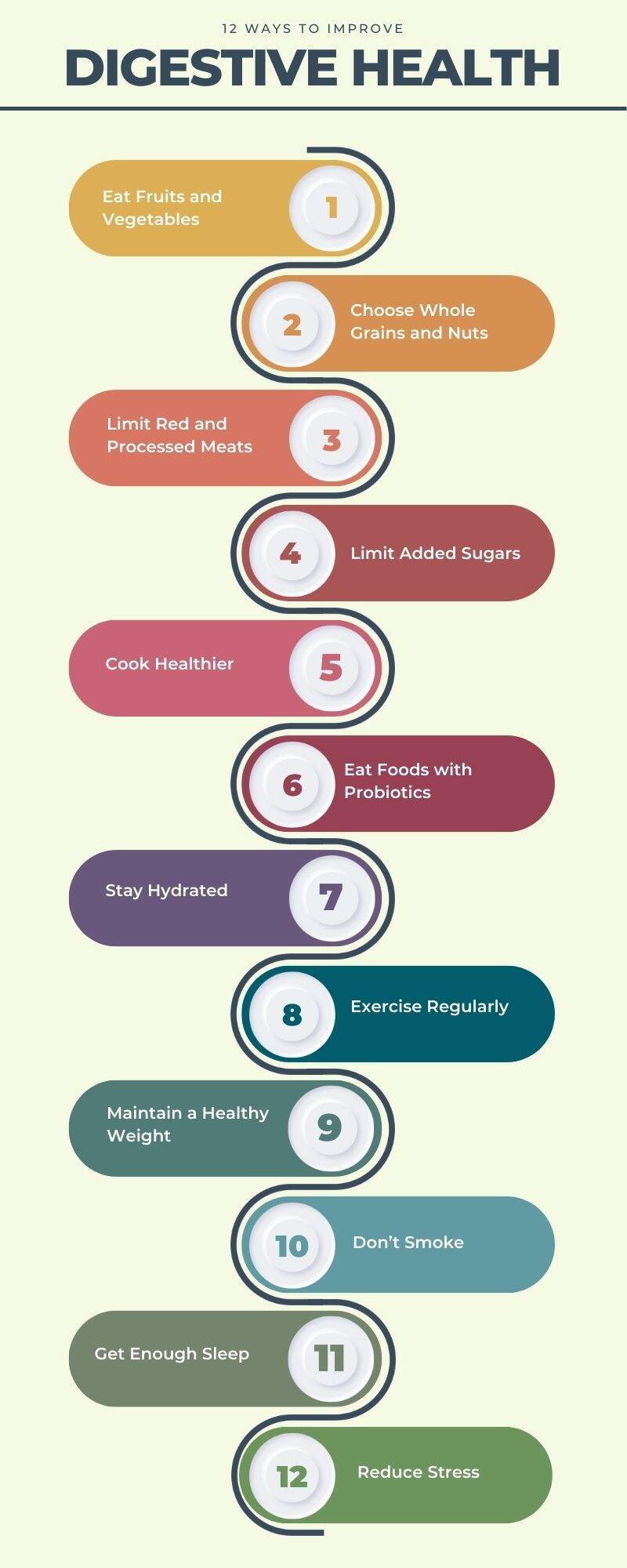Having a healthy digestive system is crucial for overall well-being. It plays a significant role in absorbing essential nutrients, eliminating waste, and supporting optimal bodily functions.
This article will explore twelve effective ways to improve your digestive health, enabling you to lead a more vibrant and fulfilling life.
Benefits of a Healthy Digestive System
Maintaining a healthy digestive system offers numerous benefits. When your digestion functions optimally, you experience increased energy levels, improved nutrient absorption, enhanced bowel regularity, and reduced risk of gastrointestinal issues. Let’s delve into specific ways to nurture your digestive health.

1. Eat Fruits and Vegetables
Fruits and vegetables are nature’s powerhouses for promoting digestive health. Packed with fiber, vitamins, minerals, and antioxidants, these nutritional gems aid in smooth digestion, prevent constipation, and contribute to a healthy gut microbiome. Make sure to include a variety of colorful fruits and vegetables in your daily diet for optimal results.
2. Choose Whole Grains and Nuts
Whole grains and nuts are excellent sources of fiber and essential nutrients that promote proper digestion. Add whole grains like quinoa, brown rice, and oats to your meals. Enjoy a handful of nuts such as almonds, walnuts, or cashews as a nutritious snack. These choices help regulate bowel movements and provide essential fatty acids for gut health.
3. Limit Red and Processed Meats
While red and processed meats may be tempting, excessive consumption can harm your digestive health. These meats are often high in unhealthy fats, sodium, and carcinogens, increasing the risk of gastrointestinal disorders. Instead, opt for lean proteins like poultry, fish, or plant-based alternatives to safeguard your digestive system.
4. Limit Added Sugars
Added sugars are notorious for causing havoc on our overall health, including digestive well-being. High sugar intake disrupts the balance of gut bacteria, promotes inflammation, and contributes to intestinal problems. Minimize your consumption of sugary beverages, sweets, and processed snacks, opting for natural sweeteners or healthier alternatives.
5. Cook Healthier
The way you cook your meals can significantly impact your digestion. Opt for healthier cooking methods such as baking, grilling, steaming, or sautéing instead of deep-frying or excessive use of oils. These cooking techniques help retain nutrients, reduce the intake of unhealthy fats, and make your meals more digestive-friendly.
6. Eat Foods with Probiotics
Probiotics are beneficial bacteria that support a healthy gut. Incorporate probiotic-rich foods into your diet, such as yogurt, kefir, sauerkraut, or kimchi. These foods introduce beneficial bacteria into your digestive system, promoting balanced gut flora, improved digestion, and enhanced immune function.
7. Stay Hydrated
Adequate hydration is essential for maintaining good digestive health. Water helps soften stools, preventing constipation and promoting regular bowel movements. Aim to drink at least eight glasses of water daily and include hydrating foods like cucumbers, watermelon, and celery in your diet for optimal hydration and digestion.
8. Exercise Regularly
Regular exercise benefits your cardiovascular health and supports a healthy digestive system. Physical activity stimulates intestinal contractions, promoting efficient bowel movements and preventing constipation. Engage in moderate exercises like brisk walking, jogging, or cycling to keep your digestive system in shape.
9. Maintain a Healthy Weight
Maintaining a healthy weight is crucial for optimal digestive function. Excess weight can pressure your digestive organs, leading to discomfort, acid reflux, and other digestive issues. Adopting a balanced diet and regular physical activity can effectively manage your weight, reducing the risk of gastrointestinal problems.
10. Don’t Smoke
Smoking has detrimental effects on the entire body, including the digestive system. It increases the likelihood of acid reflux, stomach ulcers, and digestive cancers. Quitting smoking significantly improves your digestive health and lowers the risk of developing serious gastrointestinal conditions.
11. Get Enough Sleep
Quality sleep plays a vital role in maintaining a healthy digestive system. Lack of sleep can disrupt digestion, leading to issues like acid reflux, bloating, and sluggish bowel movements. Prioritize getting seven to eight hours of uninterrupted sleep each night to support optimal digestion and overall well-being.
12. Reduce Stress
Chronic stress can wreak havoc on your digestive health. It can lead to symptoms like indigestion, abdominal pain, and altered bowel habits. Incorporate stress management techniques such as yoga, meditation, deep breathing exercises, or regular physical activity into your daily routine to keep stress levels in check and promote a healthy gut.
Conclusion
Nurturing your digestive health through conscious lifestyle choices is paramount for overall wellness. Implementing the twelve ways above can significantly improve your digestive health and help you enjoy a more vibrant life. Remember, small changes in your habits can make a significant difference in the long run. Prioritize your digestive well-being, and consult a healthcare professional if persistent symptoms or concerns arise.
FAQs
How long does it take to notice improvements in digestive health?
The timeline varies for each individual, but consistently implementing healthy habits can lead to noticeable improvements within a few weeks.
Can I still enjoy my favorite foods while improving my digestive health?
Yes, moderation is key. You can still indulge in your favorite foods occasionally, but balancing them with a nutritious and gut-friendly diet is important.
Are there any natural remedies for indigestion and bloating?
Certain herbs like peppermint, ginger, or chamomile tea can relieve relief. However, it’s advisable to consult a healthcare professional for persistent symptoms.
Is it necessary to take probiotic supplements for a healthy gut?
While supplements can be beneficial in some cases, incorporating probiotic-rich foods into your diet is usually sufficient for maintaining a healthy gut.
When should I seek medical attention for persistent digestive problems?
Suppose you experience persistent or severe symptoms such as chronic abdominal pain, unexplained weight loss, or blood in the stool. In that case, it’s important to consult a gastroenterologist for a proper diagnosis and treatment plan.
Consult a healthcare professional before significantly changing your diet or lifestyle. Your doctor can provide personalized advice based on your needs and medical history.


